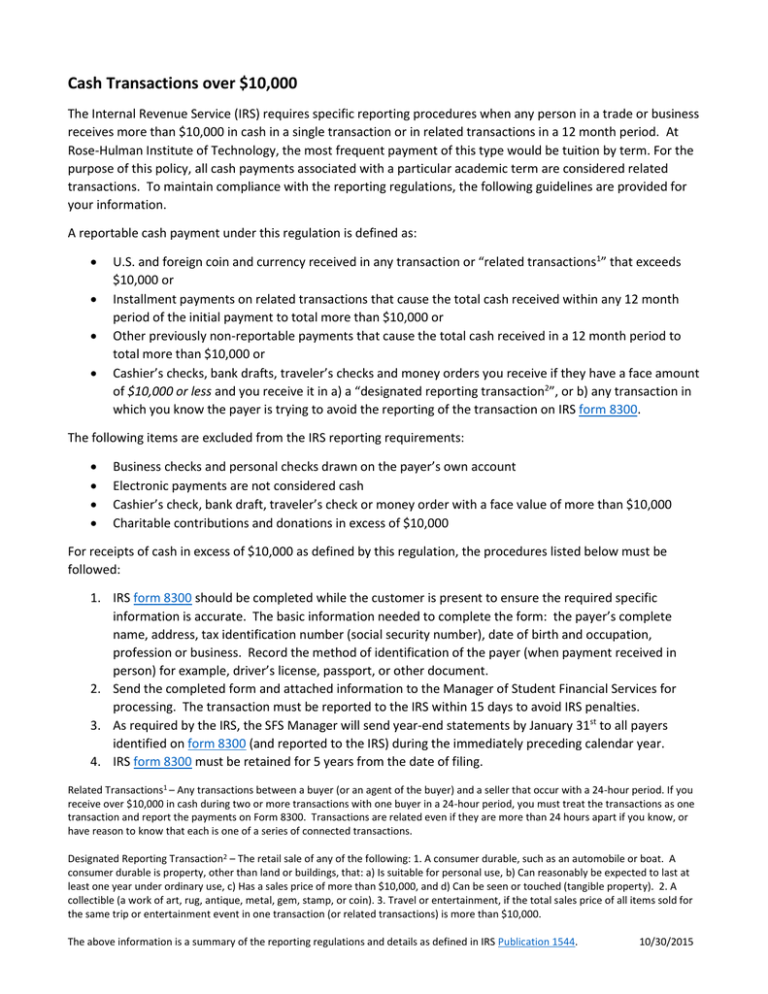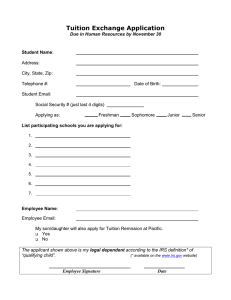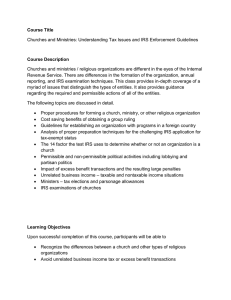Cash Transactions over $10,000
advertisement

Cash Transactions over $10,000 The Internal Revenue Service (IRS) requires specific reporting procedures when any person in a trade or business receives more than $10,000 in cash in a single transaction or in related transactions in a 12 month period. At Rose-Hulman Institute of Technology, the most frequent payment of this type would be tuition by term. For the purpose of this policy, all cash payments associated with a particular academic term are considered related transactions. To maintain compliance with the reporting regulations, the following guidelines are provided for your information. A reportable cash payment under this regulation is defined as: U.S. and foreign coin and currency received in any transaction or “related transactions1” that exceeds $10,000 or Installment payments on related transactions that cause the total cash received within any 12 month period of the initial payment to total more than $10,000 or Other previously non-reportable payments that cause the total cash received in a 12 month period to total more than $10,000 or Cashier’s checks, bank drafts, traveler’s checks and money orders you receive if they have a face amount of $10,000 or less and you receive it in a) a “designated reporting transaction2”, or b) any transaction in which you know the payer is trying to avoid the reporting of the transaction on IRS form 8300. The following items are excluded from the IRS reporting requirements: Business checks and personal checks drawn on the payer’s own account Electronic payments are not considered cash Cashier’s check, bank draft, traveler’s check or money order with a face value of more than $10,000 Charitable contributions and donations in excess of $10,000 For receipts of cash in excess of $10,000 as defined by this regulation, the procedures listed below must be followed: 1. IRS form 8300 should be completed while the customer is present to ensure the required specific information is accurate. The basic information needed to complete the form: the payer’s complete name, address, tax identification number (social security number), date of birth and occupation, profession or business. Record the method of identification of the payer (when payment received in person) for example, driver’s license, passport, or other document. 2. Send the completed form and attached information to the Manager of Student Financial Services for processing. The transaction must be reported to the IRS within 15 days to avoid IRS penalties. 3. As required by the IRS, the SFS Manager will send year-end statements by January 31st to all payers identified on form 8300 (and reported to the IRS) during the immediately preceding calendar year. 4. IRS form 8300 must be retained for 5 years from the date of filing. Related Transactions1 – Any transactions between a buyer (or an agent of the buyer) and a seller that occur with a 24-hour period. If you receive over $10,000 in cash during two or more transactions with one buyer in a 24-hour period, you must treat the transactions as one transaction and report the payments on Form 8300. Transactions are related even if they are more than 24 hours apart if you know, or have reason to know that each is one of a series of connected transactions. Designated Reporting Transaction2 – The retail sale of any of the following: 1. A consumer durable, such as an automobile or boat. A consumer durable is property, other than land or buildings, that: a) Is suitable for personal use, b) Can reasonably be expected to last at least one year under ordinary use, c) Has a sales price of more than $10,000, and d) Can be seen or touched (tangible property). 2. A collectible (a work of art, rug, antique, metal, gem, stamp, or coin). 3. Travel or entertainment, if the total sales price of all items sold for the same trip or entertainment event in one transaction (or related transactions) is more than $10,000. The above information is a summary of the reporting regulations and details as defined in IRS Publication 1544. 10/30/2015 Procedure: 1. Student Financial Services will receive a weekly report showing cash/cashier check payments with accumulated balances by term. Reported balances of greater than $10,000 will require the filing of IRS form 8300. 2. Student Financial Services will prepare a memo to the Payers of Cash over $10,000 that offers a brief explanation of the IRS form 8300 reporting requirements, and to notify them of the Institute’s obligation to file this form with the IRS. 3. Student Financial Services will prepare the IRS form 8300 to be reviewed by the Director of Business Operations. 4. Upon review approval, the form will be sent to the IRS by certified mail. A copy will be maintained for a period of 5 years from the date of filing. 5. By January 31st each year, Student Financial Services will prepare and furnish end-of-year statements to all who were identified on IRS form 8300 (and reported to the IRS) during the immediately preceding calendar year. IRS Publication 1544 includes sample completed form 8300.




